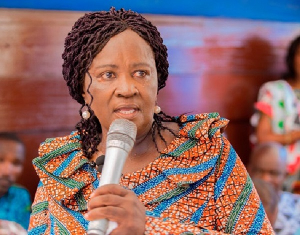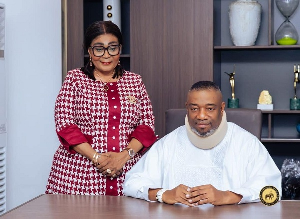On December 7, 2024, Ghana made history. For the first time in the Fourth Republic, a female vice president was elected to office.
The National Democratic Congress (NDC), led by former President John Dramani Mahama, defeated the incumbent New Patriotic Party (NPP) with 6,328,397 votes (56.55%) against 4,657,304 votes (41.61%).
Central to this historic victory was the election of Professor Naana Jane Opoku-Agyemang as the vice president, a feat that signals a significant milestone in Ghana’s democratic journey.
This victory is not merely political, but it symbolizes progress toward achieving Sustainable Development Goal (SDG) 5, which emphasizes gender equality, and promotes affirmative action to enhance women's participation in governance.
It is a win for gender advocates and every Ghanaian who envisions a nation where women are empowered to lead and make impactful decisions.
However, beyond the celebrations lies the critical question: What does the election of Ghana’s first female vice president mean for achieving SDG 5 and advancing affirmative action policies at both local and national levels?
Despite Ghana’s democratic maturity, the country continues to grapple with significant gender disparities in political representation.
For instance, as of 2024, only 22% of the 36 substantive cabinet ministers are women, highlighting the underrepresentation of women at the highest levels of executive decision-making. Similarly, in Parliament, women occupy just 14.5% of the seats, with 40 out of 275 Members of Parliament being female, an even split of 20 MPs each between the two major political parties, the NDC and NPP.
The situation is even more alarming at the local governance level, where women constitute a mere 4.1% of elected assembly members, holding just 259 out of 6,243 positions.
Furthermore, in the 2024 elections, only 119 women, accounting for 17% of parliamentary candidates, contested compared to 682 men. However, as results trickled in for the 2024 elections the already inadequate number of women further dwindled as a lot of the old faces have lost their seats.
These figures underscore the persistent challenges Ghana faces in achieving gender parity across its political landscape. These statistics fall short of international benchmarks, such as the 30% critical minority quota, signalling an urgent need for structural reforms to bridge the gender gap.
Expectations of Ghana’s First Female Vice President
As Ghana’s first female vice president, Prof. Opoku-Agyemang is positioned not just as an administrative leader but as a symbol of hope and change. Her role transcends ceremonial duties. It is a call to action to address systemic barriers limiting women's representation in political and leadership spaces in Ghana.
1. Championing Affirmative Action Implementation
One of the key steps toward achieving gender equality is the enactment of Affirmative Action legislation. Although President Nana Addo Dankwa Akufo-Addo has officially assented to the Affirmative Action Gender Equity Bill 2024, which was passed by Parliament in July this year, it remains unimplemented.
As vice president, she should leverage her position to advocate for its full
implementation, ensuring gender quotas in political and decision-making spaces aligning Ghana with international conventions such as CEDAW, the AU Agenda 2063, and the African Charter on Democracy, Elections, and Governance (ACDEG).
Efforts should also be targeted at ensuring the implementation of the 30% quota for women in all political appointments as stated in the NDC’s manifesto by the President-elect, H.E John Dramani Mahama.
2. Empowering Women in Local Governance
Local governance remains one of the most underrepresented spheres for women in Ghana. The vice president should ensure the effective collaboration between district and municipal assemblies with district civil society organizations and political parties through the designated Ministry to implement capacity-building programs aimed at preparing women for leadership roles at the grassroots level.
3. Addressing Economic Barriers for Women
Economic barriers often limit women’s active participation in politics. Prof. Opoku-Agyemang should see to the full implementation of the Women’s Development Bank, national apprenticeship program and other women-related policies as stated in the party’s manifesto to provide financial support and mentorship programs for aspiring female leaders.
She should spearhead a legislative move to eliminate taxes on essential items like sanitary pads, making them affordable and accessible, a move that aligns with promoting women's dignity and well-being.
4. Policy Advocacy and Implementation
To achieve SDG 5, Ghana must integrate gender-sensitive policies across all sectors.
The vice president can lead efforts to ensure gender mainstreaming in national development policies, with a focus on education, healthcare, and economic empowerment. Programs targeting girls’ education, mentorship, and leadership training should be prioritized to build a pipeline of future female leaders.
In conclusion, the election of Ghana’s first female vice president is more than a historic milestone. It is a transformative moment that can redefine the country’s approach to gender equality and affirmative action.
Prof. Naana Jane Opoku-Agyemang’s leadership should not only inspire but also pave the way for systemic change. By championing policies that promote gender inclusivity, she can help Ghana achieve SDG 5 and set an example for other African nations.
Opinions of Friday, 13 December 2024
Columnist: Prince Eli Dormenyo















